The Ultimate Guide to AI Cold Calling: Setup, Strategies & Success
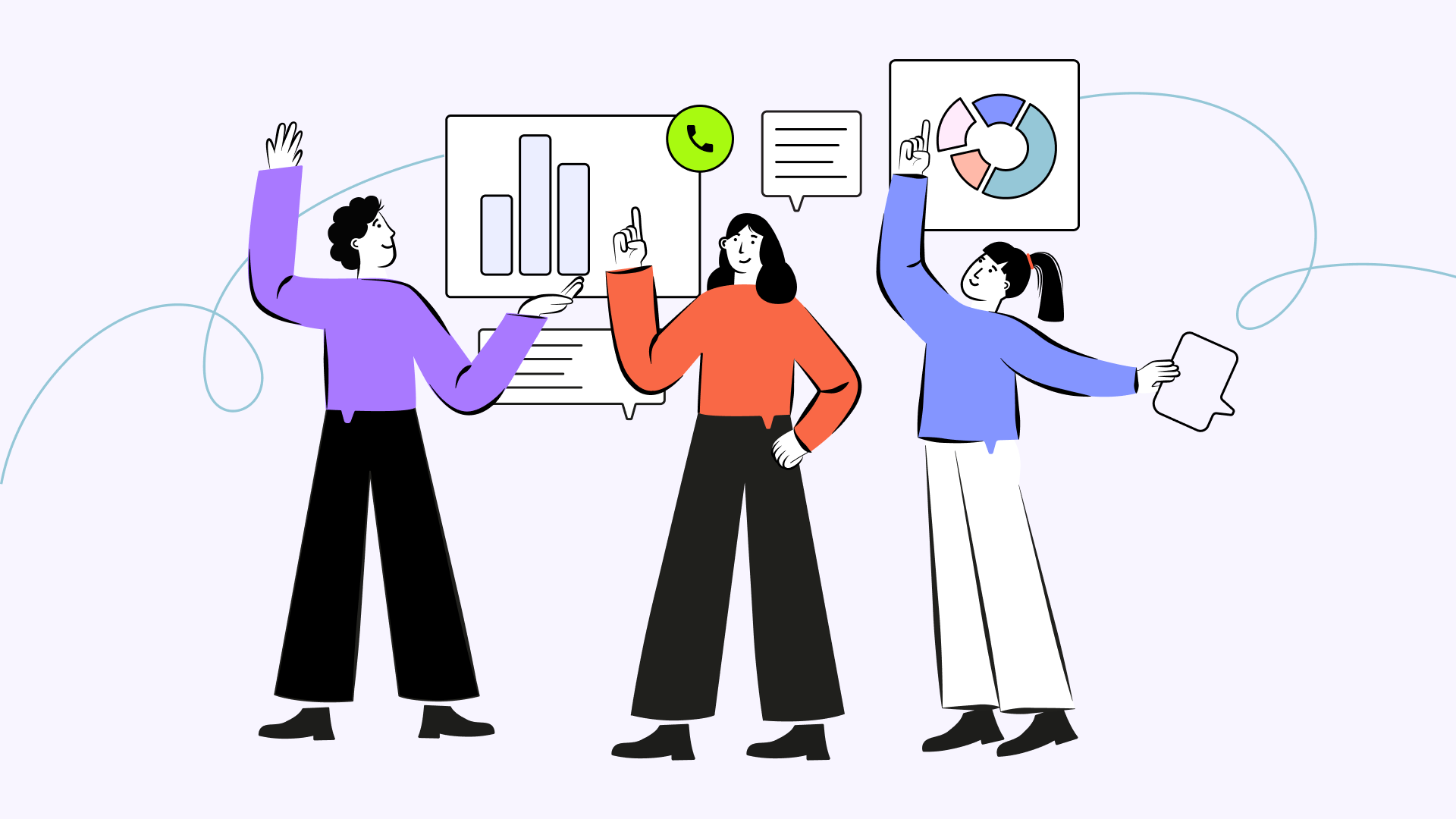
Cold calling has long been a staple of outbound sales, but let’s be honest—manual cold calling can be inefficient, repetitive, and downright frustrating. However, AI can help, even increasing leads by 50%.
By implementing this technology, you can automate outreach, analyze conversations, and help your teams close more deals with less effort.
But how do you set it up correctly? What strategies work best? And is AI cold calling even legal? This guide answers all those questions (and more), offering step-by-step instructions, expert insights, and actionable strategies to help you optimize your AI-powered outreach.
Key Takeways
- Traditional cold calling is inefficient—AI cold calling software automates outreach and qualifies leads faster.
- Conversational AI cold calling personalizes interactions, improving engagement and conversion rates.
- AI cold callers use speech analytics and automation to optimize AI sales calls and follow-ups.
- Automated cold calling software enhances productivity by reducing manual dialing and repetitive tasks.
- AI-assisted sales teams close more deals with smarter cold calling systems and AI telemarketing tools.
Ready to transform your sales strategy? AI cold calling software automates outreach and helps you close more deals
What is AI Cold Calling?
Generally speaking, cold calling is the practice of reaching out to potential clients who have not expressed any prior interest in your product via phone. The main goal of cold calling is to build awareness and interest, generate leads, and ultimately close deals.
In that sense, AI cold calling is simply the strategy of using AI-based solutions to optimize the cold-calling process. This can include conversation AI, but also sentiment analysis, an AI cold caller, or other related features.
Is AI Cold Calling Legal?
Before diving into AI-powered sales calls, it’s crucial to understand the legal landscape. AI cold calling is legal in most regions but must comply with key regulations:
- TCPA (USA): Requires consent before using automated dialers.
- GDPR (Europe): Enforces strict rules on data collection and customer consent.
- DNC (Do Not Call) Lists: Businesses must ensure they do not contact restricted numbers.
AI
How to Be Compliant When Using AI
- Keep records of opt-ins and opt-outs for compliance tracking
- Use AI to assist human reps, not replace them entirely.
- Obtain consent before making AI-powered sales calls.
How to Set Up AI Cold Calling (Step-by-Step)
Step 1: Choose the Right AI Cold Calling Software
Look for a solution that includes:
- Power Dialer: Automatically dial a list of numbers, reducing downtime between calls and increasing agent productivity.
- Call Flow Designer: Customize the path of incoming calls to ensure they reach the most appropriate agent or department.
- Skill-Based Routing: Assign calls to agents based on their expertise, ensuring customers are connected to someone who can best address their needs.
- Call Monitoring: Listen to live calls, whisper guidance to agents without the customer hearing, or join calls when necessary.
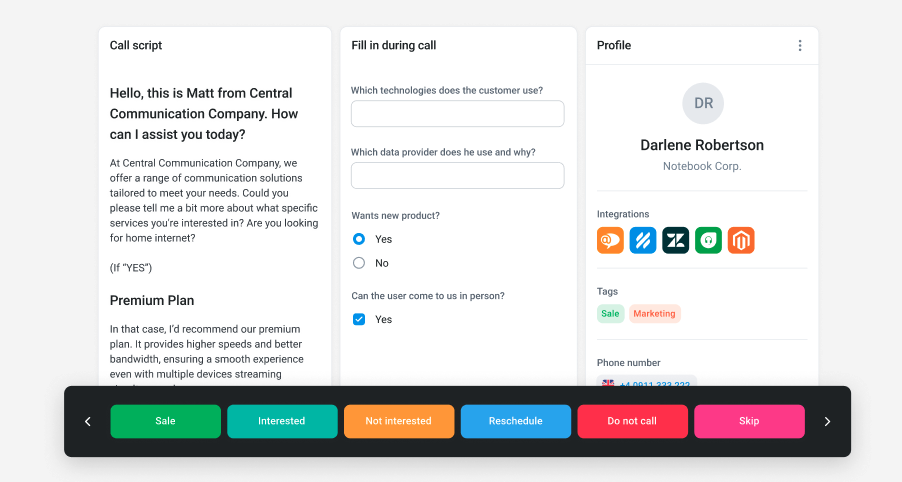
Step 2: Upload and Organize Your Lead List
Contact Tags: Use this feature to categorize and segment your leads based on criteria like industry, engagement level, or past interactions. This organization helps in prioritizing high-value prospects.
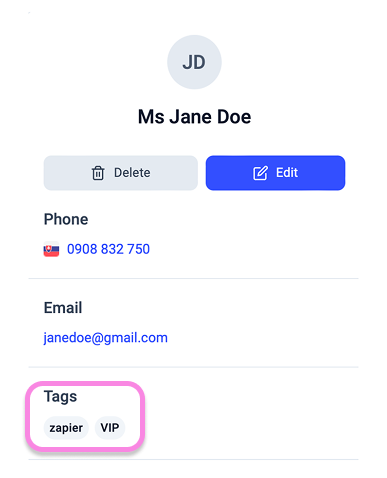
Step 3: Customize Call Scripts and AI Features
- Call Scripts: Develop tailored scripts to guide agents during calls, ensuring consistent messaging and the ability to address common objections effectively.
- Call Transcription & Sentiment Analysis: Automatically transcribe calls and analyze customer sentiment to gain insights into conversations, allowing for adjustments in strategy and training.
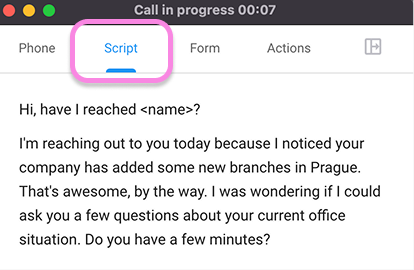
Step 4: Automate Dialing & Call Routing
- Power Dialer: Leverage this feature to automate the dialing process, enabling agents to focus more on conversations rather than manual dialing.
- Interactive Voice Response (IVR): Set up an IVR system to interact with callers, gather information, and route them to the appropriate agent or department.
Step 5: Analyze Performance and Optimize
- Analytics: Utilize CloudTalk’s analytics to monitor key performance indicators such as call duration, conversion rates, and agent performance. This data-driven approach allows for continuous improvement.
- Call Recording: Review recorded calls to identify areas for improvement, ensure compliance, and provide targeted feedback to agents.
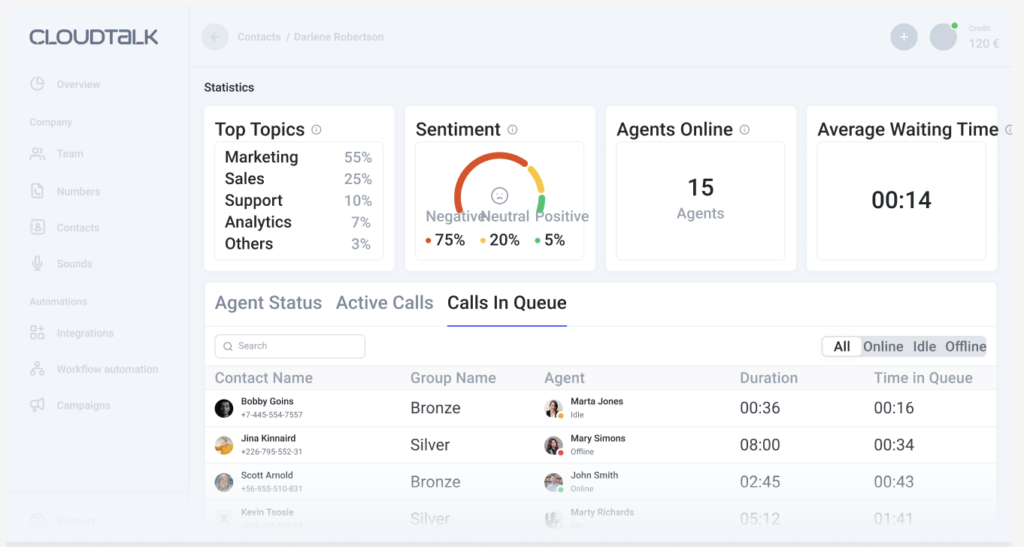
How to Use AI for Cold Calling: 5 Best Practices and Tips
- Personalization is Key: Leverage AI-powered insights to customize each call. AI can analyze past interactions and customer data to tailor conversations, making them more relevant and engaging. Addressing specific pain points increases the chances of conversion.
- Timing Matters: AI cold callers can determine the optimal times to reach prospects based on historical data. Contacting leads when they are most likely available and receptive can significantly improve connection rates. Avoid peak hours when potential customers may be too busy to engage.
- AI + Human = Success: AI should assist reps, not replace them. While AI can automate dialing, analyze sentiment, and suggest responses, a human touch is still essential. Reps should personalize their engagement to foster genuine connections and trust with prospects.
- Use AI to Train Your Sales Team: AI-driven analytics can help identify top-performing sales reps and best practices. AI coaching tools provide real-time feedback, enabling reps to refine their pitches and handle objections more effectively. Continuous learning ensures ongoing improvement.
- Follow Compliance Best Practices: AI cold calling systems must adhere to legal regulations. Ensure that AI only calls leads who have given explicit consent. Regularly update DNC lists and configure AI to comply with TCPA and GDPR rules. Staying compliant prevents legal risks and builds customer trust.
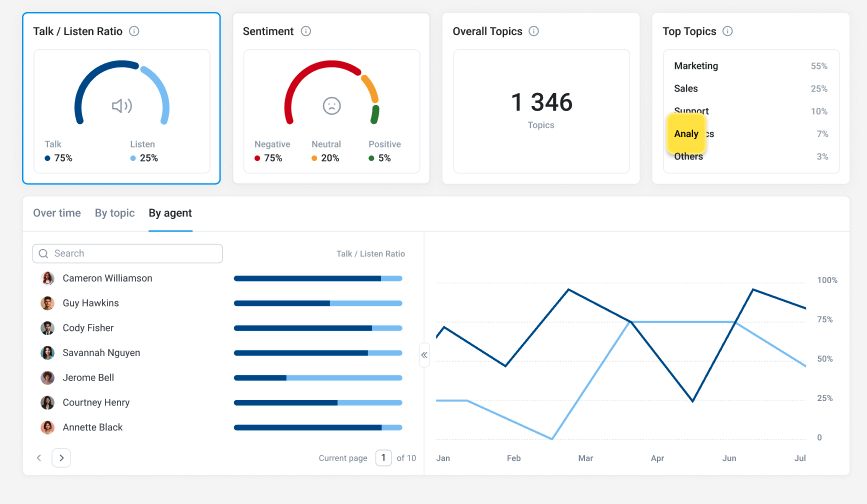
Enhance Your Cold Calling Efficiency with CloudTalk’s AI Solutions
We asked Josh Jones, a veteran sales expert, to compare traditional cold calling with AI-assisted outreach. Here’s what he had to say:
Cold calling is like knocking on a hundred doors, hoping one opens—often met with rejection, wasted time, and inefficiency. AI cold calling, on the other hand, knocks on the right doors, with the right message, making every call count
Josh Jones, Business Development Senior Manager CloudTalk
Benefits of AI Cold Calling
AI-powered tools improve cold call targeting by 35%¹, helping sales teams identify high-quality leads more effectively, while 70%² of users report that AI saves them time, allowing them to focus on building relationships and closing deals.
Implementing AI in cold calling can significantly enhance your sales strategy. Here are the key benefits:
Increase Sales Team Efficiency
AI cold callers automate repetitive tasks such as manual dialing and follow-ups, allowing your sales team to focus on high-value activities. This leads to improved productivity and more effective use of resources. Automated cold-calling software ensures faster outreach with minimal effort.
Know When to Close the Deal
Conversation AI for cold calling uses sentiment analysis to evaluate how your customers feel at any particular moment during your sales pitch and correlate it to what’s been said, letting agents know when to make a sale.
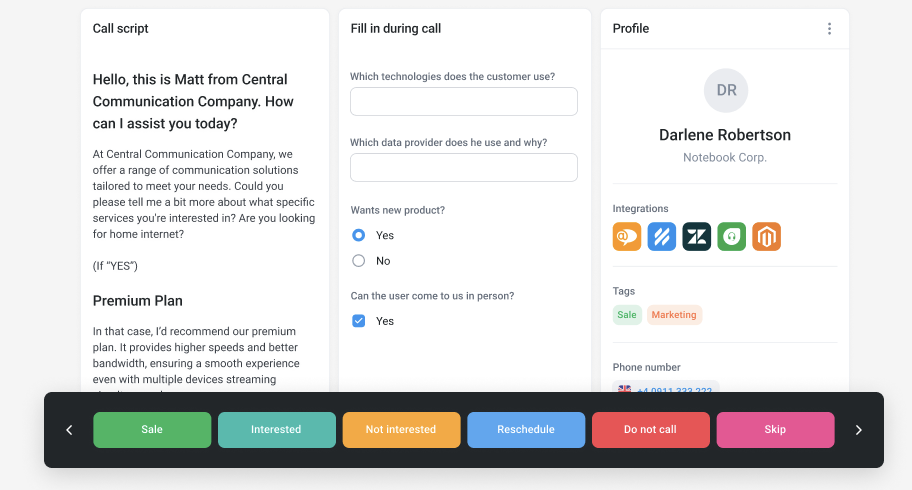
Prioritize High-Quality Leads
AI for cold calling analyzes data to identify and prioritize leads with the highest conversion potential. This ensures your team focuses on the most promising prospects, optimizing their time and increasing success rates in AI-assisted sales.
Increase Performance with Insights
AI cold calling bots provide immediate feedback and tracking analytics during calls, offering sales representatives real-time guidance. This helps in delivering more effective pitches, handling objections efficiently, and improving overall call quality.
Scale Outreach with AI Telemarketing
AI telemarketing automates key parts of the cold calling system, reducing the need for extensive human resources. AI cold calling software allows your team to reach more prospects at scale while keeping costs low.
What Are the Key Features of AI in Cold Calling?
Integrating AI into your cold calling strategy can revolutionize your sales process. Here are five essential features to consider:
Sentiment Analysis Enhances Conversations
Sentiment analysis evaluates customer emotions during calls, providing agents with real-time insights to adjust their approach. This use of AI for cold calling leads to more personalized interactions and improved customer satisfaction.
Conversational AI Personalizes Outreach
Conversational AI cold calling tailors interactions based on prospect data, making each call more relevant and engaging, increasing lead conversion. CloudTalk’s features enable your agents to deliver customized pitches that resonate with prospects.
Power Dialers Automate Dialing
AI-driven cold calling systems like power dialers automatically call a list of numbers, reducing downtime between calls and increasing agent productivity. CloudTalk’s Power Dialer streamlines outbound calling, so agents focus on closing deals.
Boost Your Sales with CloudTalk’s Power Dialer.
Intelligent Routing Makes Call Flows More Efficient
Intelligent call routing directs calls to the most appropriate agent based on predefined criteria, ensuring prospects speak with someone best suited to address their needs. This improves first-call resolution rates and enhances the customer experience.
Analytics Give Actionable Insights
CloudTalk analytics provide immediate feedback on call performance, enabling managers to make data-driven decisions and adjust strategies promptly. Access to live metrics helps in identifying areas for improvement and recognizing top performers.
Challenges and Considerations with AI Cold Calling
While AI cold calling software offers efficiency and scalability, there are some challenges to consider. Here are four key factors to keep in mind:
Challenge & Solution
Lack of human connection
Train reps to add personal touches, use AI insights wisely.
Compliance concerns
Use AI to screen numbers and track opt-ins.
Data accuracy
Regularly clean and update your lead database.
Learning curve
Provide training on AI features and workflow integration.
Challenge
Solution
Lack of human connection
Train reps to add personal touches, use AI insights wisely.
Compliance concerns
Use AI to screen numbers and track opt-ins.
Data accuracy
Regularly clean and update your lead database.
Learning curve
Provide training on AI features and workflow integration.
Worried about Setup? CloudTalk helps you through every stage of implementing and setting up your AI calling software.
Top 6 Best AI Tools for Cold Calling
Finding the right AI cold calling software can improve outreach and efficiency—here are six top tools to consider.
1. CloudTalk: AI-Powered Cold Calling and Business Phone Solution
CloudTalk is the next generation of AI cold calling software designed for SME sales and support teams. Since 2016, we’ve helped 4,000+ businesses transform conversations into conversions, making AI-assisted sales and customer experience their competitive edge.
Why Choose CloudTalk?
- Affordable Pricing: Plans start at 25 per user/month, with additional numbers for just $6.
- Global Coverage: Access international, toll-free, and local numbers in 160+ countries.
- AI-Powered Automation: Let AI handle repetitive sales tasks, so your team can focus on closing deals.
- Robust Integrations: Seamlessly connect with 100 AI-driven features and 35 integrations.
Flagship Features for AI Cold Calling & Sales
- Conversational AI for Sales Calls: Get real-time insights to enhance AI cold calling conversations.
- Real-Time Dashboard: Track performance instantly and optimize AI sales calls.
- Call Flow Designer: Automate and customize AI cold calling systems for seamless call routing.
- AI Power Dialer: Speed up outreach with automated cold calling software.
- AI-Powered Analytics: Gain deep insights into your AI telemarketing efforts.
Pricing:
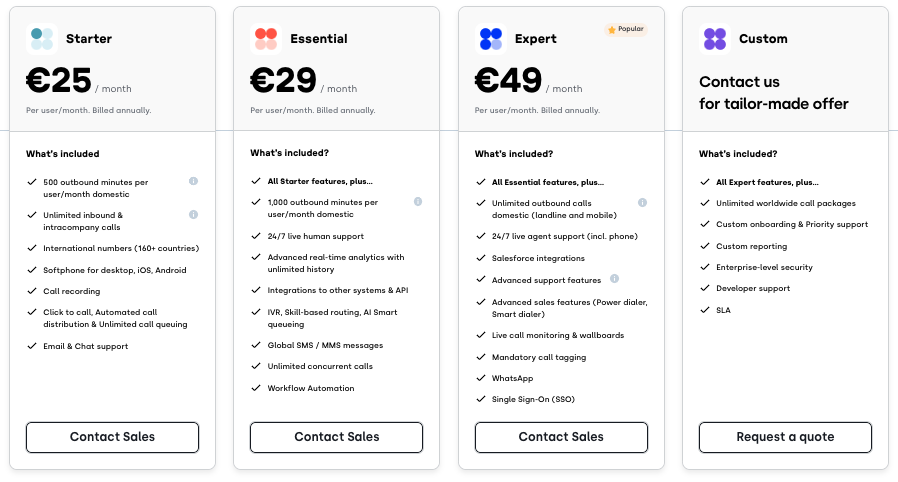
Try CloudTalk’s AI-Powered Cold Calling Software
2. JustCall
JustCall is an AI-driven communication platform designed for SMB sales and support teams. Since 2016, it has helped 6,000+ businesses improve conversations, automate workflows, and enhance team coaching.
Why Choose JustCall?
- Affordable Pricing: Plans start at just $19 per user/month with essential features.
- User-Friendly Interface: Designed for all tech levels, making adoption quick and easy.
- Reliable Customer Support: Responsive teams providing fast and helpful assistance.
- Extensive Integrations: Connect with 100+ CRMs, Helpdesks, and business tools.
Flagship Features for AI-Powered Sales & Support
- Conversation Intelligence: AI-driven insights to optimize AI cold calling and customer interactions.
- X-Channel Transcription: AI sales calls are automatically transcribed across multiple channels.
- SMS & MMS Automation: Enhance AI-assisted sales with automated follow-ups.
- AI Agent Coaching: Real-time AI coaching for improved cold calling system performance.
- Analytics: Actionable insights to refine AI telemarketing and sales strategies.
Limitations to Consider
- Call Quality Issues: Reports of frequent delays, dropped calls, and audio choppiness.
- Limited Global Coverage: Only supports international and toll-free numbers in 77 countries.
- Performance Concerns: Slow app performance and difficult troubleshooting impact efficiency.
- Integration Problems: Some integrations experience compatibility issues or don’t work reliably.
Pricing:
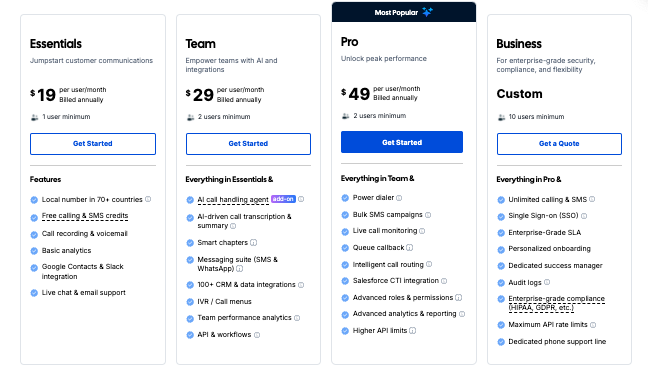
3. Ringover
Ringover is an AI-powered communication solution designed for SME staffing and sales teams. Since 2005, it has helped 10,000+ businesses, primarily in France, unify their communication channels for improved efficiency.
Why Choose Ringover?
- Competitive Pricing: Packages start at $21 per user/month with basic features.
- User-Friendly Interface: Designed for all tech levels, making it easy to adopt.
- Reliable Customer Support: Quick response times and helpful assistance.
- Extensive Integrations: Connects with 100+ CRMs, Helpdesks, and business tools.
Flagship Features for AI Assisted Sales & Support
- Unlimited Calls to 110 Destinations: Reach customers worldwide without extra costs.
- AI Conversational Intelligence: Gain real-time insights to optimize sales conversations.
- Instant Messaging: Centralized communication for faster internal and external responses.
- Smart Dialer: Automates outbound calls to increase sales team efficiency.
- Surveys: Collect customer feedback to improve engagement and service quality.
Limitations to Consider
- Call Quality: Frequent reports of delays, dropped calls, and audio choppiness.
- Limited Global Coverage: Only supports international and toll-free numbers in 65 countries.
- Performance Issues: Users report slow app performance and difficult troubleshooting.
- Opaque Contracts: Some customers experience hidden fees and challenges canceling subscriptions.
Pricing:
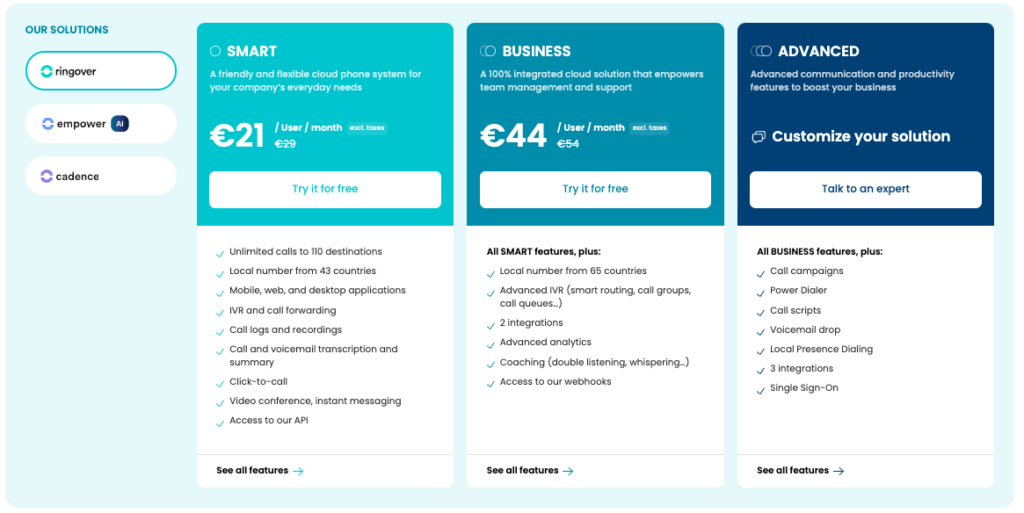
4. 8×8
8×8 is an AI-assisted sales and contact center platform designed for SME sales and support teams. Since 2002, it has helped 3,000,000+ businesses unify communication channels and improve customer interactions.
Why Choose 8×8?
- Competitive Pricing: Packages start at $24 per user/month with basic features.
- In-Depth Analytics: Advanced reporting tools for tracking agent performance and caller insights.
- Omnichannel Support: Seamless access to multiple communication channels for a unified experience.
- Extensive Integrations: Connects with 65+ CRMs, Helpdesks, and business tools.
Flagship Features for AI Sales Calls & Support
- Intelligent Customer Assistant: AI-driven automation for handling customer inquiries efficiently.
- Media Hot & Cold Storage: Securely store and manage call recordings and data.
- Interactive Meetings: Video and voice conferencing tools for seamless team collaboration.
- Team Messaging: Instant chat functionality for internal communication and workflow management.
- Secure Pay: Payment processing system designed to ensure compliance and security.
Limitations to Consider
- Confusing UI: A steep learning curve that requires extensive onboarding and training.
- Limited Global Reach: Supports international and toll-free numbers in only 55 countries.
- Performance Issues: Users report slow app performance and troubleshooting difficulties.
- Basic Feature Set: Compared to competitors, the platform provides fewer advanced tools.
Pricing:
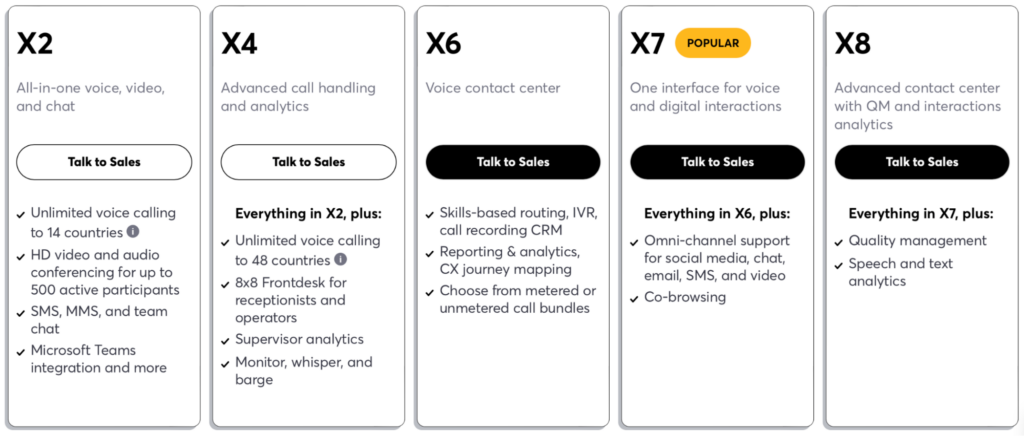
5. Talkdesk
Talkdesk is a global cloud contact center built for enterprise sales and support teams. Since 2011, it has helped 50,000+ businesses transform customer experiences and improve operational efficiency with AI-assisted sales solutions.
Why Choose Talkdesk?
- HD Calls: Provides stable, stutter-free call quality for better customer interactions.
- Extensive Integrations: Connects with 115+ CRMs, Helpdesks, and AI-driven tools.
- User-Friendly Interface: Designed for easy adoption, even for non-technical teams.
- Advanced AI Analytics: Delivers real-time insights to improve AI cold calling performance.
Flagship Features for AI-Driven Sales & Support
- Custom Integration Builder: Enables AI cold calling software to integrate seamlessly with existing workflows.
- Self-Service Automation: Reduces agent workload with AI-powered automation tools.
- Business Intelligence: Provides actionable insights to optimize AI sales calls and performance.
- Custom IVR Flows: Personalizes call routing for AI cold calling bots and live agents.
- AI Coaching: Helps sales teams improve AI-assisted sales conversations with real-time guidance.
Limitations to Consider
- Prohibitive Pricing: High-cost plans may not be suitable for SMBs needing AI telemarketing solutions.
- Opaque Contracts: Users report hidden fees and challenges canceling subscriptions.
- Performance Issues: Reports of slow app performance and troubleshooting difficulties.
- Limited Customization: Features lack the flexibility for complex AI cold calling system setups.
Pricing:

6. RingCentral
RingCentral is an AI-driven communications platform designed for teams across industries. Since 1999, it has helped 5,000,000+ businesses enhance customer interactions, streamline workflows, and improve team collaboration with AI-assisted sales tools.
Why Choose RingCentral?
- Competitive Pricing: Plans start at $20 per user/month with essential features.
- Easy Calling: AI cold callers can start immediately with an intuitive, no-training-needed design.
- HD Calls: Provides stable, high-quality calls with minimal lag or distortion.
- Multilingual Transcriptions: AI-powered transcriptions support global teams by translating conversations.
Flagship Features for AI-Powered Sales & Support
- Live Transcriptions & Summaries: AI sales calls are automatically recorded and summarized for efficiency.
- Team Messaging: Enables seamless AI-assisted sales communication within teams.
- AI Translations: Supports multilingual conversations, making AI cold calling software more versatile.
- Business SMS: Automates text outreach, complementing AI cold calling bots for lead follow-ups.
- Analytics: Provides insights into AI telemarketing performance and customer interactions.
Limitations to Consider
- Customer Service: Response times are slow, with some tickets taking several hours to resolve.
- Limited Global Coverage: Only supports international and toll-free numbers in 100+ countries.
- Performance Issues: Users report slow app speed and troubleshooting difficulties.
- Basic Feature Set: Lacks some advanced AI cold calling system features found in competitors.
Pricing:
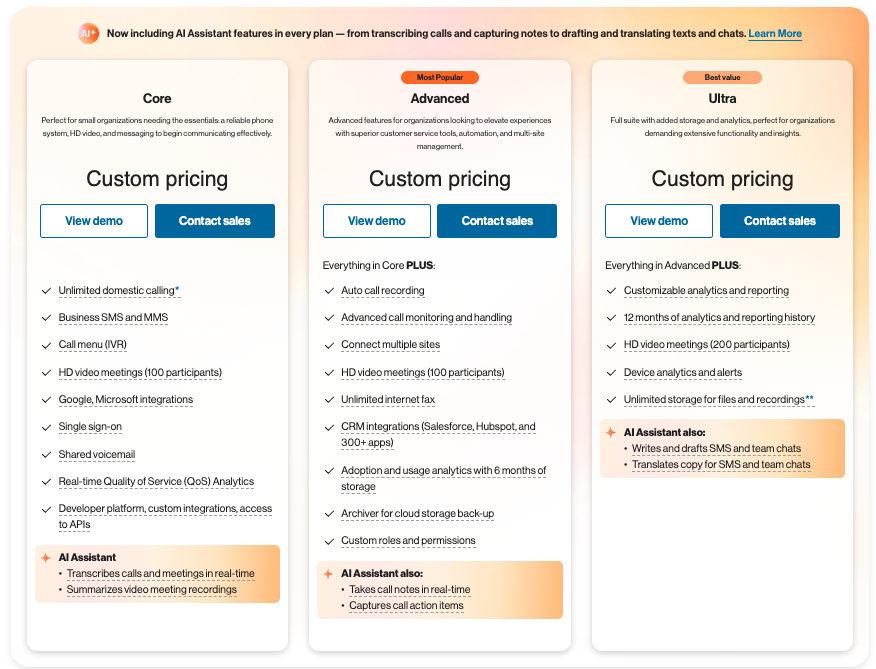
Elevate Your Sales with AI Cold Calling
AI cold calling is transforming sales teams by automating outreach, increasing efficiency, and improving lead engagement. By integrating AI cold calling software, you can scale smarter, personalize conversations, and close more deals.
Ready to supercharge your cold calling strategy? Try CloudTalk’s AI-powered cold calling system for free and see the difference for yourself!
Learn how AI can Improve Your Sales Calls.
Source:
FAQ
What is AI Cold Calling?
AI cold calling uses AI to automate dialing, personalize scripts, analyze calls, and optimize outreach, helping sales teams improve efficiency and conversions.
Is AI cold-calling illegal?
AI cold calling is legal but must comply with TCPA, GDPR, and DNC lists. Businesses must follow consent and compliance regulations.
What is the 80/20 rule in cold calling?
The 80/20 rule states that 80% of sales come from 20% of prospects, encouraging sales teams to focus on high-value leads
How to use AI for cold calling?
AI automates dialing, lead prioritization, call scripts, and analytics, helping teams boost efficiency and improve conversion rates.
How does AI enhance the cold-calling process for sales teams?
AI automates repetitive tasks, personalizes interactions, analyzes data, and optimizes call timing, making cold calling more efficient and scalable.
How does artificial intelligence compare to manual cold calling?
AI cold callers automate dialing, personalize scripts, and analyze performance, while manual cold calling is slower and less data-driven.
How to use AI for B2B sales?
AI in B2B sales helps with lead scoring, automated outreach, personalized follow-ups, and real-time coaching, increasing efficiency and conversions.
How much does AI cold calling cost?
AI cold calling software pricing starts at $20–$50 per user/month, with advanced AI features costing more based on integrations and automation level.

























